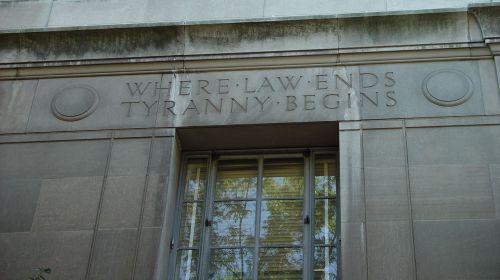ACLU and Yale Clinic Seek Secret Court Opinions Authorizing NSA’s Bulk Collection of Americans’ Records


Today, we filed our second motion in five months in the Foreign Intelligence Surveillance Court (FISC) asking for public access to secret court opinions authorizing government surveillance en masse. The motion seeks to uncover the original and complete legal underpinnings of the government’s bulk collection of Americans’ records, such as our internet-usage history and location information. It was filed by the national ACLU, the ACLU of the Nation’s Capital, and the at Yale Law School (MFIA).
In June, just days after The Guardian the NSA’s bulk phone records collection, the ACLU and MFIA filed a motion with the FISC, requesting the release of its secret opinions authorizing the program under Section 215 of the Patriot Act. We argued that the public has a constitutional right to know the legal justification for the government’s mass call-tracking program.
In September, the court granted that motion in part, ordering the government to conduct a declassification review of its opinions addressing Section 215. (The court excluded opinions that were already covered by the ACLU’s ongoing Freedom of Information Act lawsuit for some of the same opinions.) However, since we filed our motion in June, we have learned that the court’s opinions addressing Section 215 are not the only secret court opinions addressing the bulk collection of Americans’ data under the Foreign Intelligence Surveillance Act (FISA). As we put it in our new motion:
Since [the ACLU and the MFIA] filed that motion, . . . it has become clear that other critical opinions of this Court approving the bulk collection of Americans’ information remain secret. [We] seek access to those opinions for two reasons. First, some of those opinions pertain to other forms of bulk collection that the government has now acknowledged, such as the bulk collection of internet metadata and cell-site location information. The public is entitled to know the legal bases for those programs, but those bases have not yet been disclosed. Second, some of those opinions predate the call-tracking program and apparently supply the original legal analysis necessary to understand this Court’s later authorization of the call-tracking program. For example, it appears that one of the earlier bulk-collection opinions provides the Court’s most comprehensive discussion both of the constitutionality of bulk collection under the Fourth Amendment and of the meaning of the term “relevant” as it appears in various FISA provisions.
Moreover, Senators Ron Wyden (D-Ore.) and Mark Udall (D-Colo.), who both sit on the Senate Select Committee on Intelligence, have that these “surveillance authorities are not limited to phone records . . . and can be used to collect any type of records whatsoever.” It therefore remains an whether the FISC’s interpretations of FISA permitting bulk collection have been applied to authorize the bulk collection of other types of sensitive information about Americans, such as credit card records, medical records, or financial data.
With this new filing, the ACLU continues to demand greater transparency surrounding the NSA’s breathtakingly expansive surveillance activities. It is crucial that the American people be given access to the legal interpretations that sanction these programs so that they can evaluate those interpretations for themselves. As Sen. Wyden recently The Washington Post:
The original legal interpretation that said that the Patriot Act could be used to collect Americans’ records in bulk should never have been kept secret and should be declassified and released... This collection has been ongoing for years and the public should be able to compare the legal interpretation under which it was originally authorized with more recent documents.

